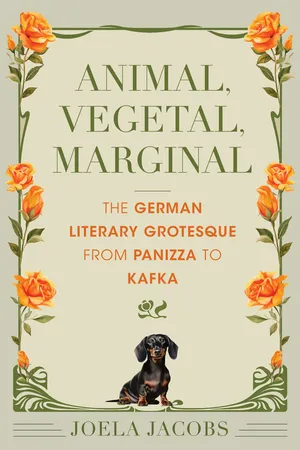
Animal, Vegetal, Marginal
The German Literary Grotesque from Panizza to Kafka
- English
- ePUB (mobile friendly)
- Available on iOS & Android
About this book
Between the Kaiser's and Hitler's Reichs, the genre of die Groteske, or the German literary grotesque, sold out cabarets, drew droves of radio listeners, and created bestsellers with its irreverent comedy and critique. At the same time, its authors were ruthlessly censored for their satire of society, leaving die Groteske virtually unknown today.
As the first full-length study of the genre, Animal, Vegetal, Marginal recovers this short prose form, which draws on the perspectives of marginalized animals, plants, and individuals to challenge what it means to be human. Author Joela Jacobs traces the development of the genre and its variations from the work of Oskar Panizza, Hanns Heinz Ewers, and Salomo Friedlaender to Franz Kafka.
Animal, Vegetal, Marginal shows how marginalized and nonhuman voices mounted resistance against the rise of the biopolitical structures underpinning nationalism, racism, and antisemitism in the decades leading up to the Second World War.
Frequently asked questions
- Essential is ideal for learners and professionals who enjoy exploring a wide range of subjects. Access the Essential Library with 800,000+ trusted titles and best-sellers across business, personal growth, and the humanities. Includes unlimited reading time and Standard Read Aloud voice.
- Complete: Perfect for advanced learners and researchers needing full, unrestricted access. Unlock 1.4M+ books across hundreds of subjects, including academic and specialized titles. The Complete Plan also includes advanced features like Premium Read Aloud and Research Assistant.
Please note we cannot support devices running on iOS 13 and Android 7 or earlier. Learn more about using the app.
Information
Table of contents
- Cover
- Half-Title Page
- Title Page
- Copyright
- Contents
- Acknowledgments
- Introduction
- Section 1: The Grotesque: A Censored Literary Genre and Its Authors
- Section 2: The Vegetal: Panizza, Ewers, and Turn-of-the-Century Censorship
- Section 3: The Animal: Panizza, Kafka, and the Modernist Crisis of the Self
- Section 4: The Human: Panizza, Friedlaender, and the Rise of Fascism
- Conclusion
- Notes
- Bibliography
- Index
- About the Author